SSA Hearing Tips for SOAR Practitioners Please stay on the line. The
48 Slides611.00 KB

SSA Hearing Tips for SOAR Practitioners Please stay on the line. The webinar will begin shortly. AUDIO: Toll Free Number: (855) 749-4750 Access code: 660 367 515 Contact [email protected] if you experience technical difficulties. This webinar is being recorded and will be available for download within 1 week of this presentation.

SSA Hearing Tips for SOAR Practitioners PRESENTED BY: SAMHSA SOAR TECHNICAL ASSISTANCE CENTER POLICY RESEARCH ASSOCIATES, INC. UNDER CONTRACT TO: SUBSTANCE ABUSE AND MENTAL HEALTH SERVICES ADMINISTRATION U.S. DEPARTMENT OF HEALTH AND HUMAN SERVICES

Welcome! KRISTIN LUPFER, LMSW, PROJECT DIRECTOR, SOAR TECHNICAL ASSISTANCE CENTER, POLICY RESEARCH ASSOCIATES, DELMAR, NEW YORK

Webinar Instructions Muting Recording availability Downloading documents Evaluation Question instructions

Learning Objectives Know the major activities performed by SSA’s hearing office called the Office of Disability Adjudication and Review (ODAR) Know what is expected from the Authorized Representative when preparing for a hearing in a Social Security disability claim. Know what is expected from the Authorized Representative when conducting a hearing in a Social Security disability claim.

Agenda The SSA Hearing: Preparing for ALJ Hearings Sarah F. Anderson, JD, Senior Attorney with Greater Boston Legal Services in Boston, MA The SSA Hearings: Conducting ALJ Hearings Jessica F. Krefman, JD, Attorney & SOAR Local Lead with Office of Recipients Rights/Livingston County Community Mental Health in Howell, MI SOAR Benefits Specialist/Non-Attorney Perspective Beth Argent, Benefits Specialist & SOAR Local Lead with Mental Illness Recovery Center, Inc. in Columbia, SC Questions & Answers Facilitated by SOAR TA Center Staff

Poll Question #1 How many ALJ hearings have you participated in? a. None b. 1-5 c. More than 5

Hearing Preparation Tips for SOAR Practitioners SARAH F. ANDERSON, ATTORNEY GREATER BOSTON LEGAL SERVICES BOSTON, MASSACHUSETTS

Office of Disability Adjudication & Review ODAR holds hearings, issues decisions, review appeals Nationwide corps of ALJs hear cases de novo 10 regional offices, 168 hearing offices, 5 national hearing centers, 2 national case assistance centers Over 1,300 ALJs issue over 700,000 decisions annually

ALJ Hearings: Overview Individuals have the right to appeal denial and/or termination of SSI/SSDI claims Must file appeal within 60 days of receipt of denial of reconsideration Limited late filing for “good cause” iAppeal is SSA’s online appeal system Forms SSA-3441, SSA-827, HA-501-US must all be filed before deadline for appeal to be timely Can also mail in appeal forms, ask SSA for help

Before Hearing Prep ODAR hearing office sends acknowledgement of receipt of hearing request Introduce yourself ODAR asks for updated medical, vocational information Scheduling a hearing: up to the ALJ See if you can agree upon a date and time before Notice of Hearing is sent

Before Hearing Prep VTC (video teleconferencing) hearing Claimant must object to VTC within 30 days of notice that one may be scheduled Limited good cause for missing deadline to object Weigh the pros and cons in your case for VTC Quicker hearing, but not in same place as ALJ Could be telephonic hearing e.g. prisoners

Before Hearing Prep Takes about a year to get an in-person hearing Varies from hearing office to hearing office Check out statistics on your hearing office Remember strategies to get quicker decision or hearing On the Record (OTR) Compassionate Allowance, TERI Dire Need You need to make the case to the ALJ why she should allow the claim without in person hearing

Before Hearing Prep Pre-hearing conferences Find out if your hearing office or ALJ uses these May be used if there is no appointed representative May be used even with rep to “narrow the issues” If claimant does not show up, case may be dismissed at that point

Before Hearing Prep Get a copy of the record that ODAR is using ASAP after filing for hearing Most disability cases now have electronic records as opposed to paper records of the claim Various parts of electronic record Exhibit List, Case Documents: parts A,B,D,E,F Multimedia (audio) Get the CD from claimant or from ODAR Encrypted Need certain programs to read it on your computer

Before Hearing Prep File your letters, updated records electronically Need bar code from ODAR Some registered representatives can upload files directly to claimant’s electronic record Deadline for filing evidence before the hearing Learn what it is your location Region 1 (ME, NH, VT, CT, RI, MA) has more restrictive evidence rules known as “DSI” Request interpreter for hearing if needed

Before Hearing Prep Review the ODAR file to see what they have/what is missing for evidence Personal, medical, vocational Know what you have to prove to get benefits SSI vs. SSDI Five-step analysis of claim Develop your theory of the case A few sentences, “Susie Jones is disabled because ” Figure out how you will get the evidence that you think is missing from the case needed to prove your theory Live testimony vs written records

Pre-Hearing Prep Remember, this is first time claimant meets faceto-face with decision maker Initial, Reconsideration decisions made on records only Prepare your claimant and other witnesses for hearing Moot court, or practice sessions

Pre-Hearing Prep Write a memo to the ALJ about your case Tell the ALJ in detail why your client is disabled Cite to specific records from the Exhibit List Tell the ALJ your theory of the case Pay attention to deadlines for submitting evidence Don‘t miss them Learn about your ALJ

New Evidence Rule SSA published regulations effective 4/20/2015 clarifying their rules on evidence submission in disability cases Claimant and representative must inform or submit all evidence relevant to claim for disability Includes unfavorable medical opinion letters or other unfavorable evidence

New Evidence Rule Two exceptions to rule Attorney-client privilege Attorney work product Both apply to non-attorney authorized representatives Representative may be sanctioned for failure to comply with rule See Handout

Authorized Representative Must submit signed 1696 form SSA has rules of conduct for representatives Who can be a representative Authority of representative Prohibited conduct Sanctions for prohibited conduct

Contact Information Sarah F. Anderson Senior Attorney Elder, Health & Disability Unit Greater Boston Legal Services 197 Friend St. Boston, MA 02114 Phone: (617) 603-1581 Email: [email protected]

Poll Question #2 What is the first thing to think about when beginning to prepare for a hearing? a. Should I wear a blue or black suit to the hearing? b. What is my working theory of the case? c. How do I cross examine a Vocational Expert?

Conducting ALJ Hearings JESSICA F. KREFMAN, ATTORNEY AND SOAR LOCAL LEAD OFFICE OF RECIPIENT RIGHTS LIVINGSTON COUNTY COMMUNITY MENTAL HEALTH HOWELL, MICHIGAN

Reminder KNOW ABOUT YOUR ALJ!! Whether he/she allows witnesses, or prefers written statements/affidavits (let them know if you plan to bring witnesses) Whether he/she allows evidence to be submitted on the day of the hearing How he/she conducts a hearing His/her statistics (website)- www.disabilityjudges.com

The Day of The Hearing Dress professionally Business suit, blazer, ties for males Determine if client should dress up vs. everyday dress Arrive early At least one hour Secure conference room, or if one is unavailable, ensure that you respect all issues of confidentiality Remind client of main points of his/her testimony Remind client what to expect If your client cannot make it, call the ODAR office Your ALJ may require you to show up in order to show good cause to adjourn and reschedule.
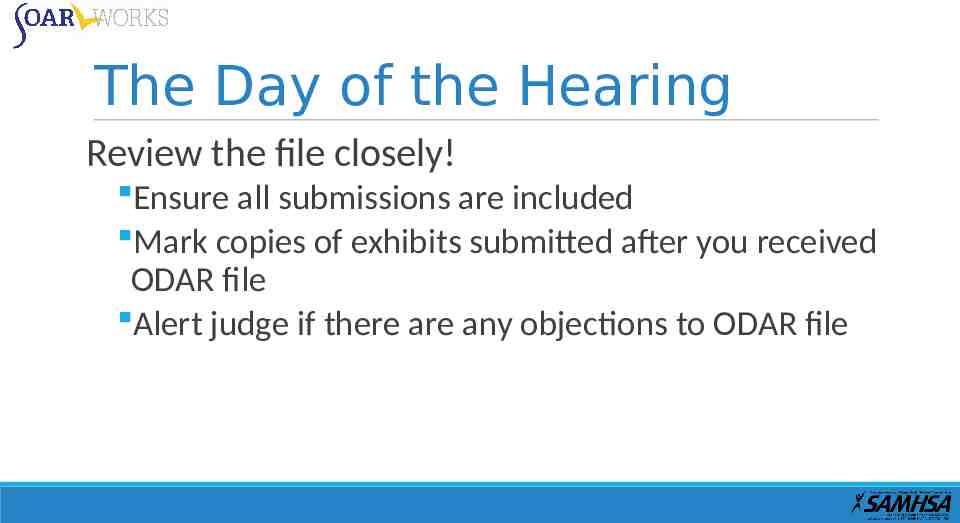
The Day of the Hearing Review the file closely! Ensure all submissions are included Mark copies of exhibits submitted after you received ODAR file Alert judge if there are any objections to ODAR file

The Hearing Non-adversarial Small and informal Not guided by federal rules of evidence BUT compliance with court room decorum is still required of the representative Closed to public Audio recorders/mics

The Hearing People present: ALJ Hearing reporter Hearing assistant (if needed) Interpreter (if needed) Claimant Representative Expert Witnesses Medical Expert (if requested by judge) Vocational Expert (if requested by judge)
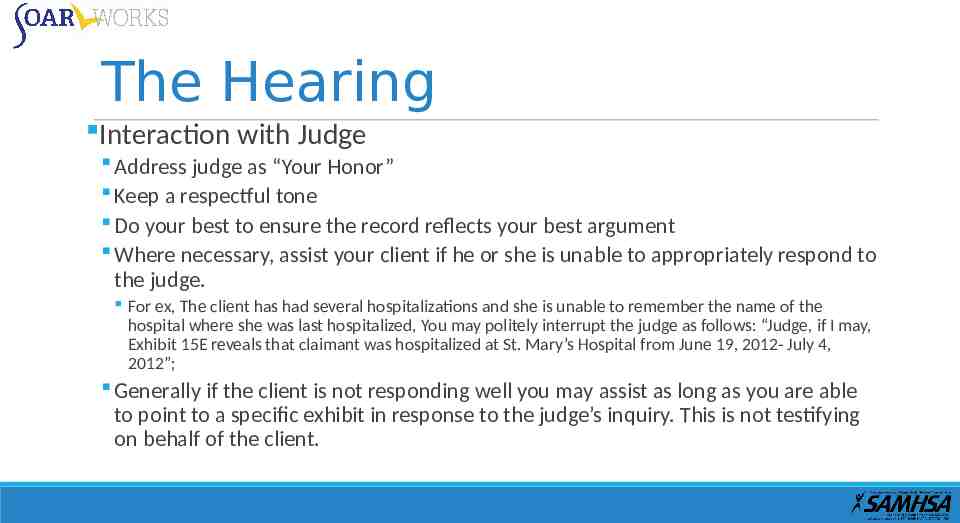
The Hearing Interaction with Judge Address judge as “Your Honor” Keep a respectful tone Do your best to ensure the record reflects your best argument Where necessary, assist your client if he or she is unable to appropriately respond to the judge. For ex, The client has had several hospitalizations and she is unable to remember the name of the hospital where she was last hospitalized, You may politely interrupt the judge as follows: “Judge, if I may, Exhibit 15E reveals that claimant was hospitalized at St. Mary’s Hospital from June 19, 2012- July 4, 2012”; Generally if the client is not responding well you may assist as long as you are able to point to a specific exhibit in response to the judge’s inquiry. This is not testifying on behalf of the client.
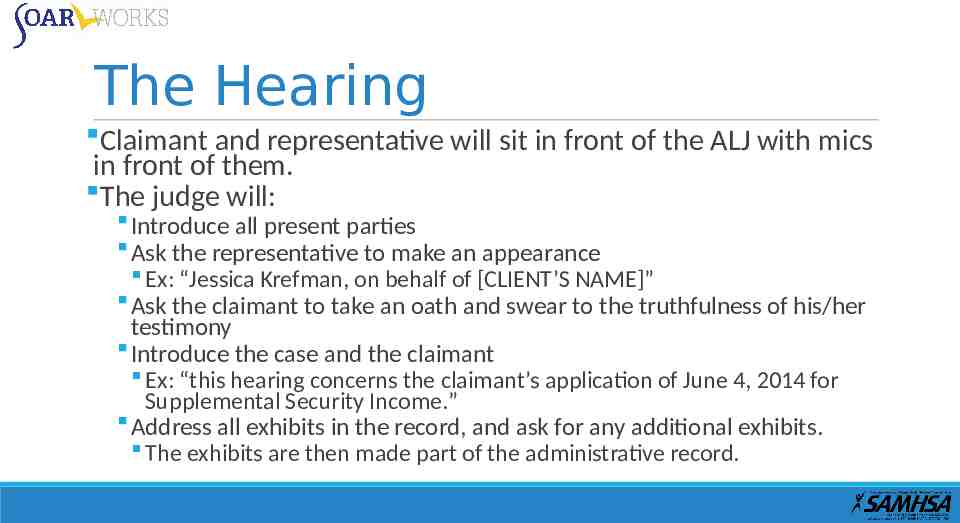
The Hearing Claimant and representative will sit in front of the ALJ with mics in front of them. The judge will: Introduce all present parties Ask the representative to make an appearance Ex: “Jessica Krefman, on behalf of [CLIENT’S NAME]” Ask the claimant to take an oath and swear to the truthfulness of his/her testimony Introduce the case and the claimant Ex: “this hearing concerns the claimant’s application of June 4, 2014 for Supplemental Security Income.” Address all exhibits in the record, and ask for any additional exhibits. The exhibits are then made part of the administrative record.
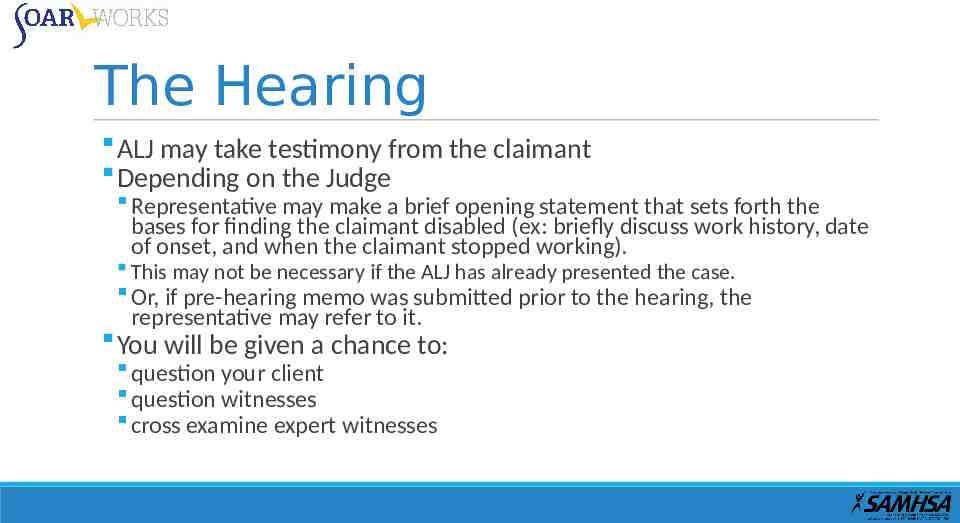
The Hearing ALJ may take testimony from the claimant Depending on the Judge Representative may make a brief opening statement that sets forth the bases for finding the claimant disabled (ex: briefly discuss work history, date of onset, and when the claimant stopped working). This may not be necessary if the ALJ has already presented the case. Or, if pre-hearing memo was submitted prior to the hearing, the representative may refer to it. You will be given a chance to: question your client question witnesses cross examine expert witnesses
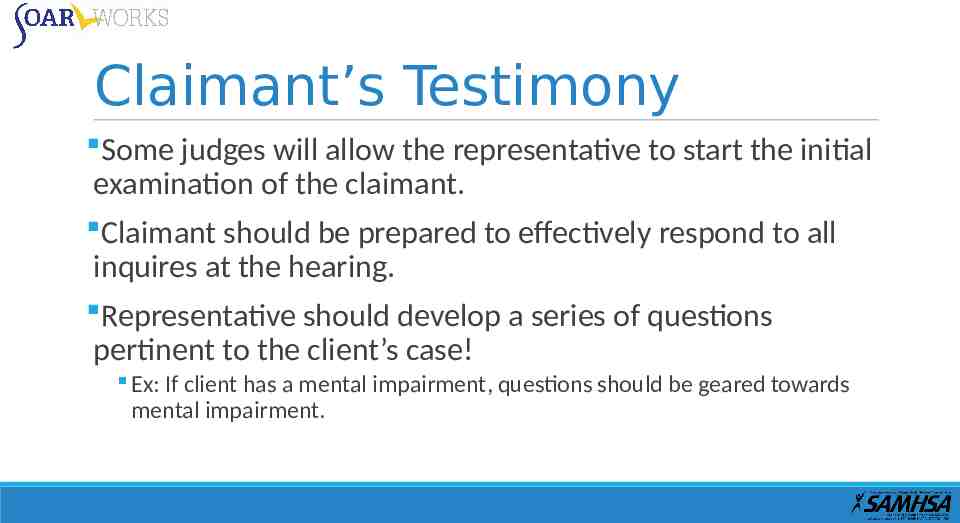
Claimant’s Testimony Some judges will allow the representative to start the initial examination of the claimant. Claimant should be prepared to effectively respond to all inquires at the hearing. Representative should develop a series of questions pertinent to the client’s case! Ex: If client has a mental impairment, questions should be geared towards mental impairment.
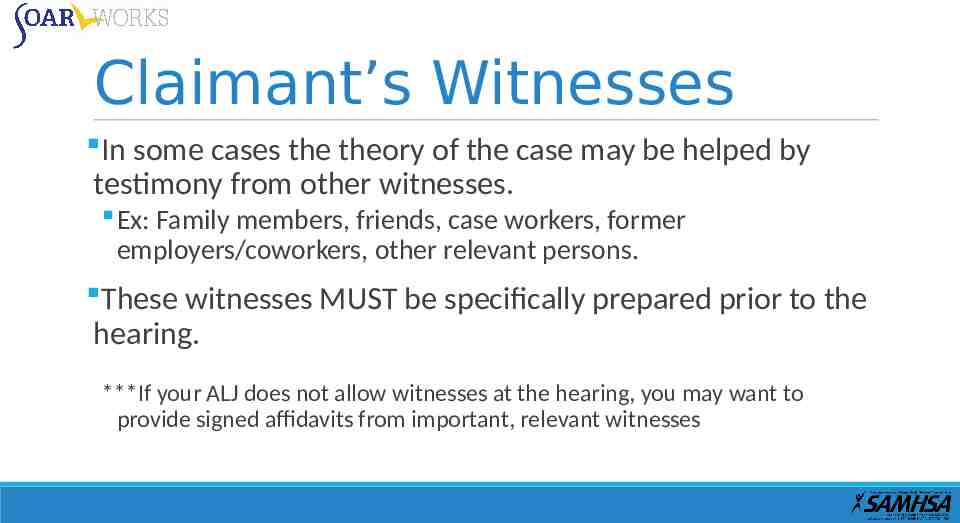
Claimant’s Witnesses In some cases the theory of the case may be helped by testimony from other witnesses. Ex: Family members, friends, case workers, former employers/coworkers, other relevant persons. These witnesses MUST be specifically prepared prior to the hearing. ***If your ALJ does not allow witnesses at the hearing, you may want to provide signed affidavits from important, relevant witnesses
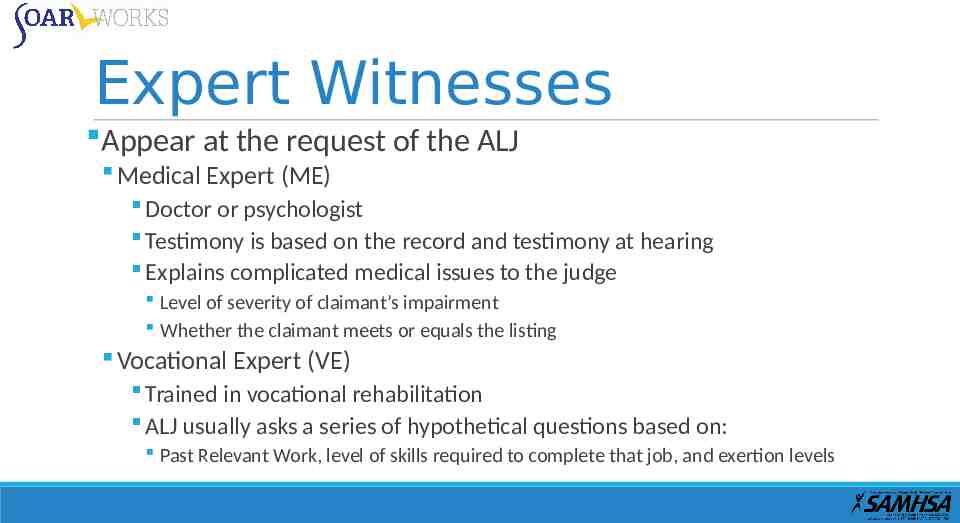
Expert Witnesses Appear at the request of the ALJ Medical Expert (ME) Doctor or psychologist Testimony is based on the record and testimony at hearing Explains complicated medical issues to the judge Level of severity of claimant’s impairment Whether the claimant meets or equals the listing Vocational Expert (VE) Trained in vocational rehabilitation ALJ usually asks a series of hypothetical questions based on: Past Relevant Work, level of skills required to complete that job, and exertion levels
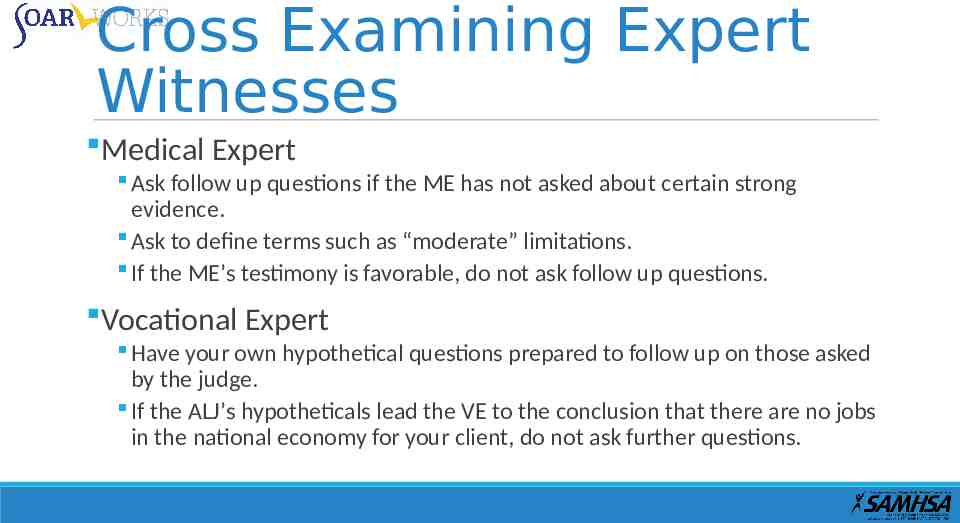
Cross Examining Expert Witnesses Medical Expert Ask follow up questions if the ME has not asked about certain strong evidence. Ask to define terms such as “moderate” limitations. If the ME’s testimony is favorable, do not ask follow up questions. Vocational Expert Have your own hypothetical questions prepared to follow up on those asked by the judge. If the ALJ’s hypotheticals lead the VE to the conclusion that there are no jobs in the national economy for your client, do not ask further questions.
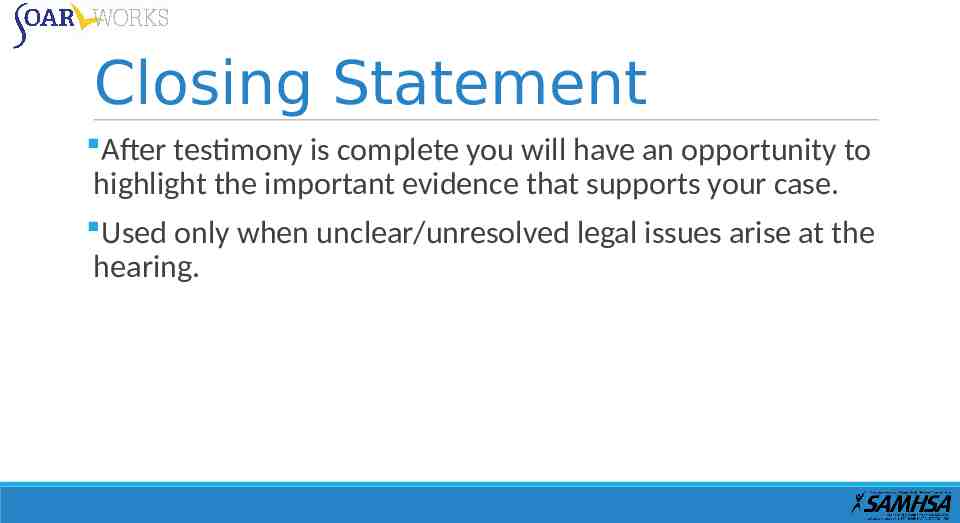
Closing Statement After testimony is complete you will have an opportunity to highlight the important evidence that supports your case. Used only when unclear/unresolved legal issues arise at the hearing.
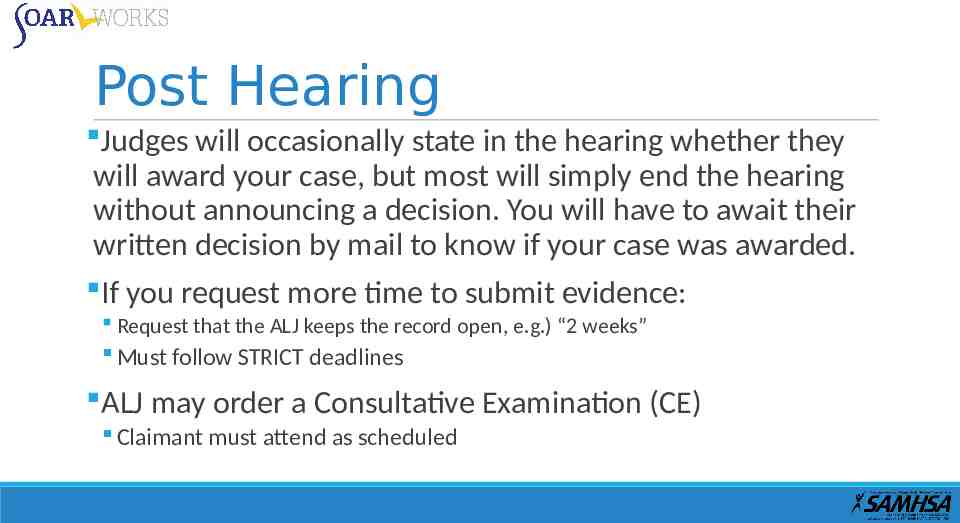
Post Hearing Judges will occasionally state in the hearing whether they will award your case, but most will simply end the hearing without announcing a decision. You will have to await their written decision by mail to know if your case was awarded. If you request more time to submit evidence: Request that the ALJ keeps the record open, e.g.) “2 weeks” Must follow STRICT deadlines ALJ may order a Consultative Examination (CE) Claimant must attend as scheduled
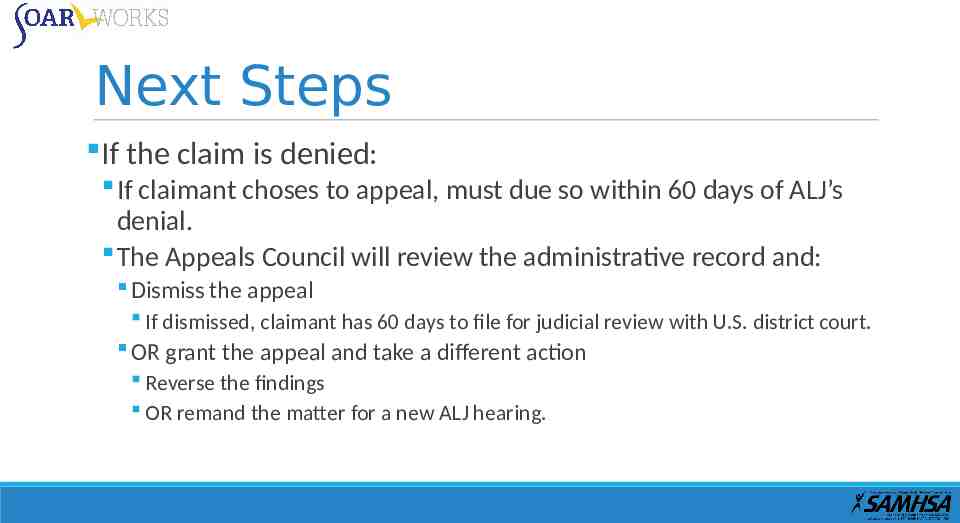
Next Steps If the claim is denied: If claimant choses to appeal, must due so within 60 days of ALJ’s denial. The Appeals Council will review the administrative record and: Dismiss the appeal If dismissed, claimant has 60 days to file for judicial review with U.S. district court. OR grant the appeal and take a different action Reverse the findings OR remand the matter for a new ALJ hearing.
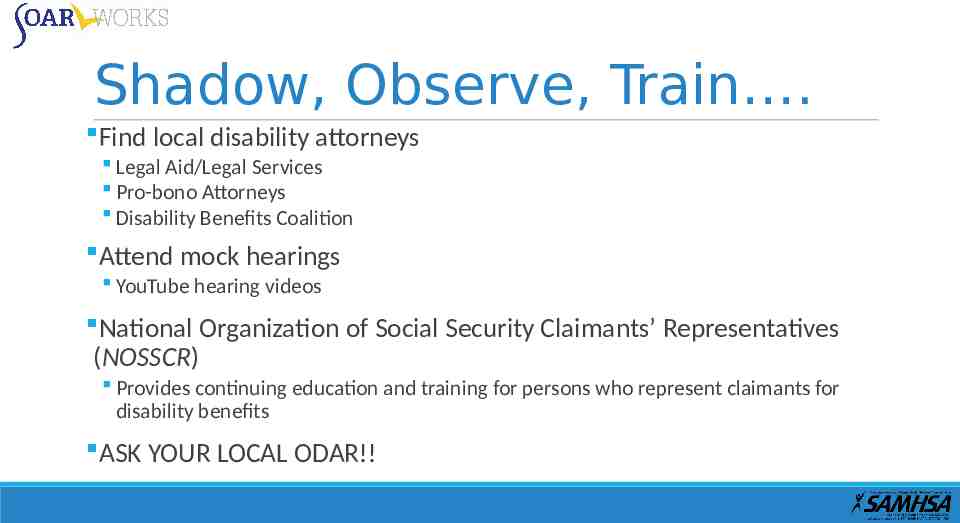
Shadow, Observe, Train . Find local disability attorneys Legal Aid/Legal Services Pro-bono Attorneys Disability Benefits Coalition Attend mock hearings YouTube hearing videos National Organization of Social Security Claimants’ Representatives (NOSSCR) Provides continuing education and training for persons who represent claimants for disability benefits ASK YOUR LOCAL ODAR!!
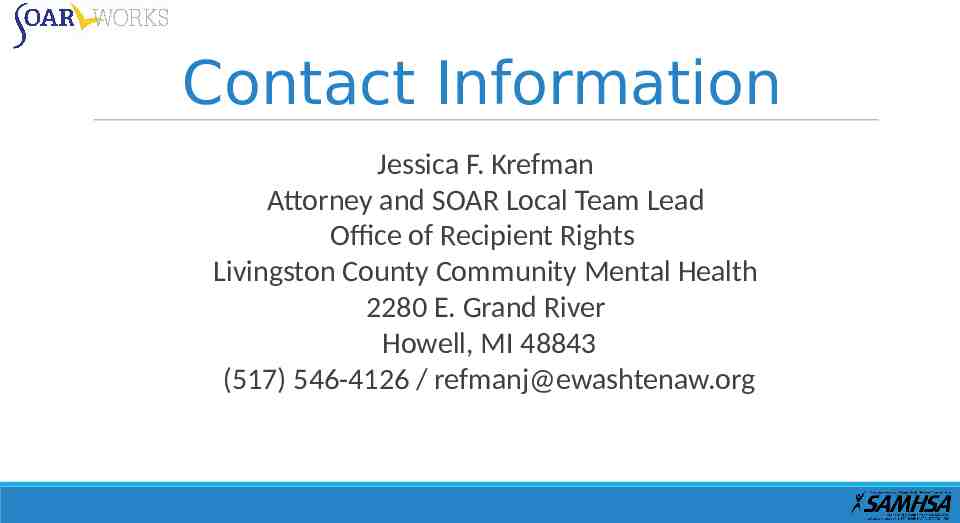
Contact Information Jessica F. Krefman Attorney and SOAR Local Team Lead Office of Recipient Rights Livingston County Community Mental Health 2280 E. Grand River Howell, MI 48843 (517) 546-4126 / [email protected]
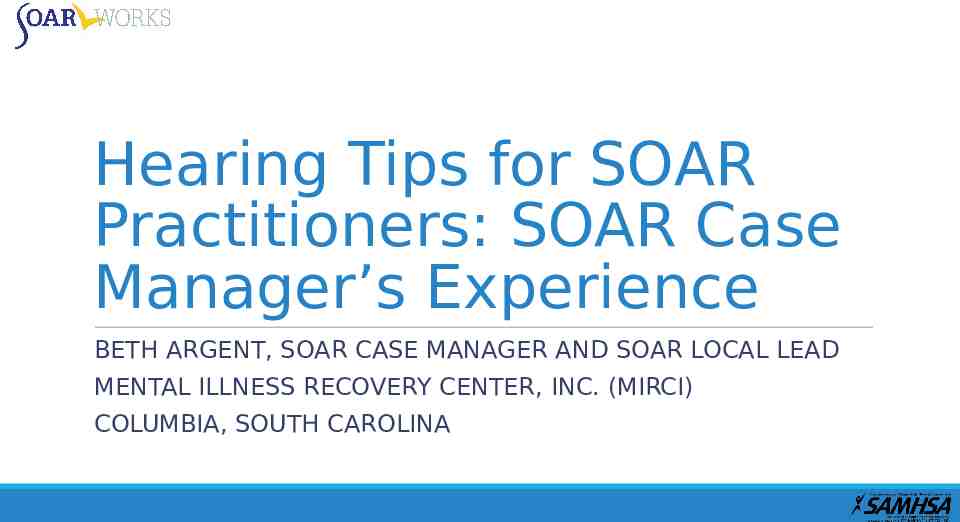
Hearing Tips for SOAR Practitioners: SOAR Case Manager’s Experience BETH ARGENT, SOAR CASE MANAGER AND SOAR LOCAL LEAD MENTAL ILLNESS RECOVERY CENTER, INC. (MIRCI) COLUMBIA, SOUTH CAROLINA
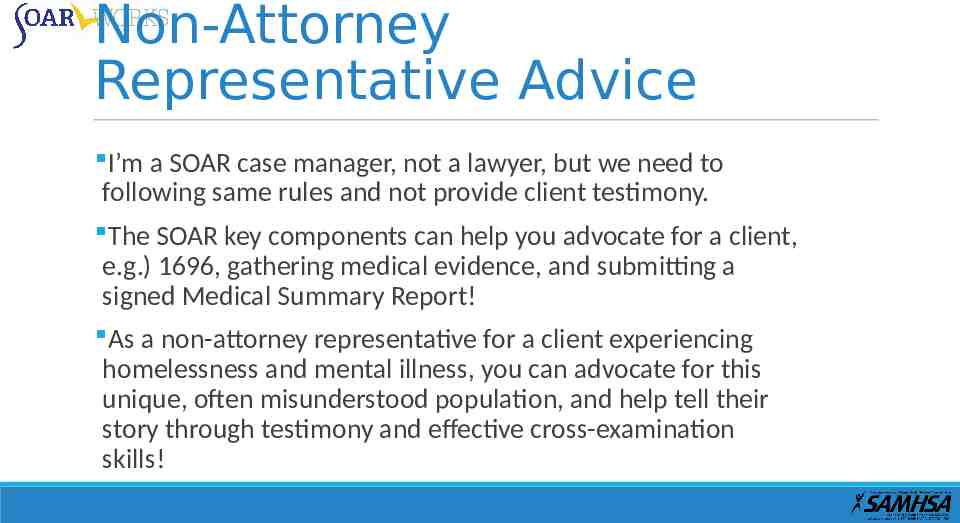
Non-Attorney Representative Advice I’m a SOAR case manager, not a lawyer, but we need to following same rules and not provide client testimony. The SOAR key components can help you advocate for a client, e.g.) 1696, gathering medical evidence, and submitting a signed Medical Summary Report! As a non-attorney representative for a client experiencing homelessness and mental illness, you can advocate for this unique, often misunderstood population, and help tell their story through testimony and effective cross-examination skills!
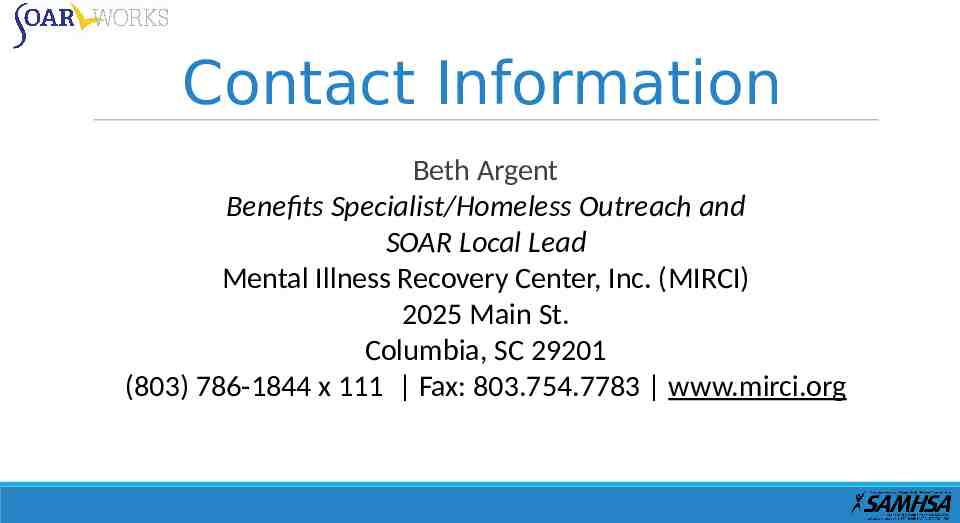
Contact Information Beth Argent Benefits Specialist/Homeless Outreach and SOAR Local Lead Mental Illness Recovery Center, Inc. (MIRCI) 2025 Main St. Columbia, SC 29201 (803) 786-1844 x 111 Fax: 803.754.7783 www.mirci.org
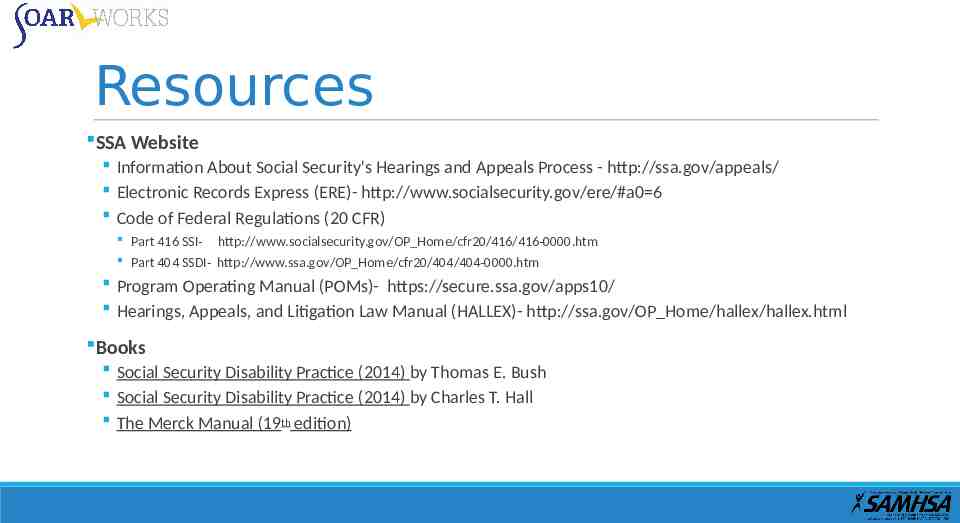
Resources SSA Website Information About Social Security's Hearings and Appeals Process - http://ssa.gov/appeals/ Electronic Records Express (ERE)- http://www.socialsecurity.gov/ere/#a0 6 Code of Federal Regulations (20 CFR) Part 416 SSI- http://www.socialsecurity.gov/OP Home/cfr20/416/416-0000.htm Part 404 SSDI- http://www.ssa.gov/OP Home/cfr20/404/404-0000.htm Program Operating Manual (POMs)- https://secure.ssa.gov/apps10/ Hearings, Appeals, and Litigation Law Manual (HALLEX)- http://ssa.gov/OP Home/hallex/hallex.html Books Social Security Disability Practice (2014) by Thomas E. Bush Social Security Disability Practice (2014) by Charles T. Hall The Merck Manual (19th edition)
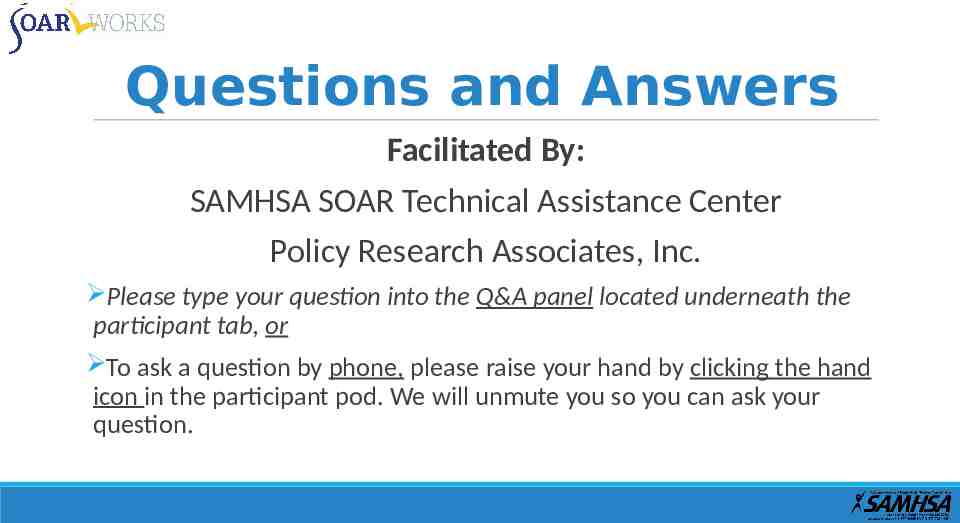
Questions and Answers Facilitated By: SAMHSA SOAR Technical Assistance Center Policy Research Associates, Inc. Please type your question into the Q&A panel located underneath the participant tab, or To ask a question by phone, please raise your hand by clicking the hand icon in the participant pod. We will unmute you so you can ask your question.
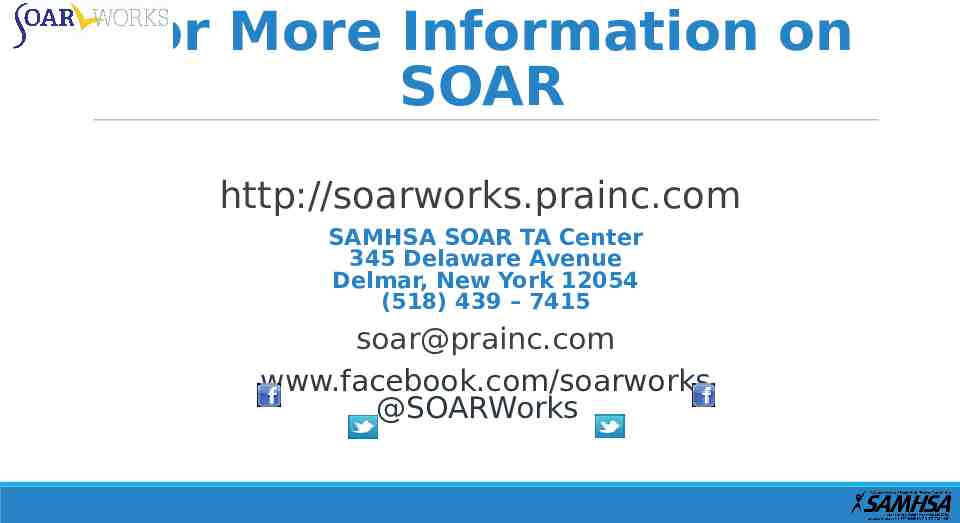
For More Information on SOAR http://soarworks.prainc.com SAMHSA SOAR TA Center 345 Delaware Avenue Delmar, New York 12054 (518) 439 – 7415 [email protected] www.facebook.com/soarworks @SOARWorks






